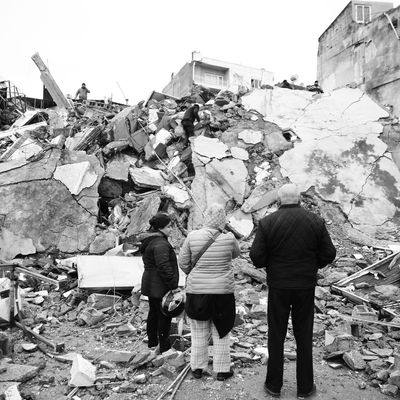
Just two weeks after more than 46,000 people were killed by a pair of powerful earthquakes that struck Turkey and Syria in early February, sending the region into a massive recovery effort amid brutal winter weather, another earthquake has hit Turkey, leaving at least 13 dead and over 200 injured.
The Guardian reports that the initial 7.8 magnitude quake hit on February 6 around the cities of Nurdağı and Gaziantep, close to Turkey’s southern border with Syria, and was felt as far away as Cyprus and Cairo. Turkey’s president, Recep Tayyip Erdoğan, called the quake the country’s worst disaster in nearly a century, and there were more than 20 aftershocks in the aftermath — including a 7.5-magnitude quake in southeastern Turkey. Turkey’s vice-president, Fuat Oktay, has said that more than 8,000 people were rescued from beneath the wreckage, and officials say it could take years to rebuild damaged infrastructure. The mass devastation has swept through provinces in Turkey where many Syrian refugees live as well as rebel-held northwest Syria, which is one of the worst-hit areas and has limited infrastructure and health-care facilities. Per the New York Times, the sole pathway between Turkey and Syria that is approved by the U.N. for international-aid transport is closed because of earthquake damage. Due to sanctions against Syrian president Bashar al-Assad’s government, the country cannot receive direct aid. The U.N. has since confirmed it sent it first aid convoy into Syria, and the Washington Post reports that additional aid trucks have entered the region since. The U.N. estimates that as many as 5.3 million Syrians have lost their homes as a result of the initial quakes.
The latest 6.3 magnitude quake struck Hatay, a province in southern Turkey, on Monday evening, devastating an area already hit hard by the earlier earthquakes and injuring at least 150 people in Syria, where there have been no confirmed deaths so far. Local Turkish officials say there are still more people trapped under the rubble and that their conditions are unknown. “All of sudden, I felt like the earth had been pulled out under my feet,” one survivor told the New York Times. Here’s how to help.
For humanitarian aid
White Helmets, also known as the Syria Civil Defense organization, is on the ground in Syria trying to rescue those under the rubble and recover the dead from collapsed buildings. Donate here.
Global Giving, a U.S.-based humanitarian nonprofit, is accepting donations for its Turkey and Syria earthquake-relief fund. The organization says the fund will initially help first responders provide survivors with food, clean water, shelter, and medicinn. Later, it will support long-term recovery efforts by local organizations. Donate here.
Save the Children has set up a children’s emergency fund to help provide kids in need with shelter, food, and warm clothing. Donate here.
CARE Türkiye, an international outpost of Care International, is preparing to deliver essential items to those seeking refuge in the aftermath of the earthquakes. Donate here.
Project Hope is deploying emergency-response teams to affected areas to help local rescue efforts and provide emergency supplies to those in need. Donate here.
To help with medical relief
Syrian American Medical Society (SAMS) works on the front lines of Syrian crisis relief. Donate here.
Doctors Without Borders/Médecins sans frontières is on the ground in northern Syria providing aid to the injured. Its teams are also donating emergency medical kits to other facilities in the region. Donate here.
Union of Medical Relief and Care Organizations (UOSSM) provides emergency medical treatment and other health-care services to Syrians. The organization is now seeking support for earthquake relief here.
Give Blood: Global Citizen reports that blood reserves in Turkey fell under the minimum 50,000 units this past January. For those based in Turkey and able to help, you can donate blood via the Turkish Red Crescent. If you can’t donate blood, consider giving a cash donation.





